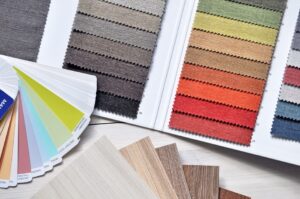Whether you are a new interior designer or a learner, it is essential to improve your skills and stay up-to-date. Interior design requires not only the ability to understand the principles of balance and harmony, perfectly apply color theory, and have spatial awareness but also demands varied and exciting work to create cozy spaces that are both aesthetically pleasing and functional.
To excel in this profession, you must be a well-rounded professional who is passionate about your work. If you’re just starting out, you might be wondering what skills you need to develop to succeed in this field. In this article, we will explore some essential interior design skills that successful interior designers possess and provide practical tips for improving your interior design abilities.
8 Interior Design Skills You Need as an Interior Designer
Before we embark on how to improve your interior design skills, let’s first unravel the tapestry of 8 essential skills and qualities that define a successful interior designer.
Imagination and Creativity
Successful interior designers are typically highly creative and imaginative. They possess the ability to envision the possibilities of an empty room and visualize how different components, such as colors, textures, furnishings, and decorations, can blend together to impact the overall mood and ambiance of the appealing spaces. Additionally, it is crucial to effectively deliver ideas to your clients in a way that is easy to understand and interpret.
Sketching and Color Basics
Interior designers with a good understanding and sense of design can use sketching as a tool to effectively convey their vision and choose the right colors to achieve a balanced and visually appealing space. Sketches can help you quickly form the content you want to create and understand how different design elements and layouts impact room appeal. Moreover, a basic understanding of color theory is essential for interior designers to have a good grasp of how colors work together, evoke emotions, and create atmospheres. Having strong sketching and color application skills can undoubtedly help you progress further and establish yourself in the interior design industry.
CAD Software Application
To go further in the industry, it is important to develop your tech skills and stay updated with the latest CAD software available on computers, including interior design software and home design software like AutoCAD, ZWCAD, and even online tools. Unlike in the past, manual drafting is no longer necessary. Skills in CAD software become increasingly essential for interior designers, as it enables 2D drafting, 3D modeling, seamless collaboration with other designers, and the ability to convey design ideas and visions to clients effectively. Although hand drawing is still a part of the creative process, and beautiful illustrations are still utilized to express the emotions or overall arrangement of space, combining artistic skills with technology can bring designers a greater competitive advantage.
Attention to Details
Attention to detail is one of the key features to distinguish a good interior designer from a greater one. There is a well-known fact in all industries – detail kills. A successful interior designer will always pay close attention to the small details like chosen accessories, meticulous selection of decorative elements, and even the texture application as they are typically the keys to creating the mood, atmosphere, and overall arrangement that the client needs. Therefore, to further dive into interior design, don’t look down on the details.
Communication Skill
Apart from creating, an interior designer also engages in a lot of communication work. Strong communication skills are the secret sauce for interior design success. They streamline workflow, ensure clients fully understand your vision, and build trust and collaboration, leading to smoother projects and happier clients. Otherwise, insufficient communication skills may lead to unnecessary design deviations and even conflicts during the process. Moreover, your talent shines brightest when you articulate it clearly. Strong communication unlocks satisfied clients, repeat business, and a booming career.
Project Management
A successful interior designer, to some extent, is also an excellent project management manager who can grasp the details while also assessing the big picture of the entire design project. The first important is that you should be able to understand the cost of all design elements. This requires you to choose affordable supplies within a limited budget while accomplishing clients’ visions. Moreover, when unexpected occurrences happen, you should be able to identify risks and quickly solve problems, so that the project can be completed before the deadline.
Time Management
Meeting deadlines is crucial for building trust and repeat business. Delighting clients with on-time project completion fosters strong relationships and leads to future opportunities. While unforeseen circumstances can arise, thorough planning and buffer time can mitigate their impact. By anticipating potential roadblocks, you can prioritize tasks effectively and set realistic timeframes that ensure client satisfaction. Remember, a well-planned schedule is not just a project roadmap, it’s a roadmap to success.
Design Trend Analysis
Staying up-to-date with design trends can give you a competitive edge. As design trends are continuously evolving, the ability to analyze and forecast future trends can boost your popularity among clients and make you a sought-after designer. Like any creative field, a skilled interior designer should be proficient in all design styles and capable of blending them as needed. Additionally, you can leverage industry updates and trends to craft your own unique interior design style, making you stand out from other designers.
4 Ways to Improve Your Interior Design Skills
So, after learning the 8 essential skills and qualities that a savvy interior designer needs, we will discuss the 4 most common ways to improve your interior design skills in this part.
Attain Certification
Continuous study and professional certifications can help interior designers advance faster in future careers. Clients’ needs keep changing, so staying up-to-date is key. Only by continuously learning and enriching one’s design knowledge can one go further. Additionally, professional certifications can be your fast track to expertise. They provide a structured framework of core industry knowledge, helping you build a solid foundation and impress your first clients with confidence. So, embrace the never-ending learning, let your creativity bloom, and paint a masterpiece of a design career.
Enroll in Design Courses
If you want to gain a deeper understanding of interior design knowledge, enrolling in relevant courses directly is the most effective method. Whether you want to improve your ability to use colors, balance space, or even manage projects, you can easily find offline or online courses for in-depth learning. Also, you can take various classes to challenge your creative skills and develop an eye for high-quality artwork, helping you effectively improve your interior design abilities. Moreover, it is a great platform to discuss design ideas with teachers and classmates to improve and create new art skills.
Seek Internships or Apprenticeships
One of the best ways to improve interior design skills is to work with clients and design spaces in the real world via internships or apprenticeships. This will allow you to gain real-world experience and develop valuable skills related to the interior design workplace before working with clients independently. Classroom learning is great, but real-world experience is the key to unlocking your design potential. You’ll hone your skills, master collaboration, and time management, and build valuable industry connections – all before launching your solo career. It’s a win-win for your skills and your network.
Expand Design Styles
Diversity in style is crucial for achieving long-term success as an interior designer. You might encounter clients who have different ideas and expectations from your own. Some clients may want you to incorporate their vision into functional design. Exploring new design styles unlocks a treasure trove of project opportunities, demonstrating your adaptability and prowess. This flexibility will build a diverse portfolio, a testament to your mastery of multiple aesthetics. Remember that box yourself in one design style, and your career might stall.
Conclusion
In conclusion, mastering interior design skills is a never-ending journey of learning and exploration for interior designers who want to build a lucrative career in this industry. So, embrace the constant evolution of the field, feed your inspiration, and watch your skills blossom. By following the tips outlined above, you’ll not only hone your skills but also unlock your unique design voice, leaving a lasting mark on every space you touch. Now, go forth and design!








